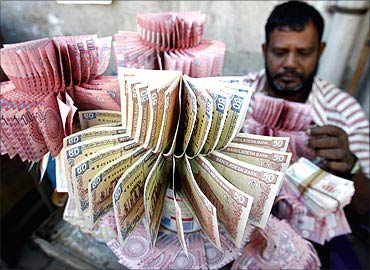Photographs: Reuters M R Venkatesh
Part-I: The mysterious case of the missing $500 billion!
Part-II: Why currency derivatives are like rigged casinos!
This is the third and final part of a series on exotic financial derivatives, how they wreaked havoc globally, and why global financial institutions seem to resemble rigged casinos.
The manner in which currency derivative contracts were structured, marketed and the conditions that enabled their marketing in the first place across continents points out to a larger design of some international banks.
As pointed out in the first two parts of this series, SMEs lost over $500 billion on currency derivatives contracts that they entered into with banks. Interestingly, in these contracts, banks never lost.
If it was sheer coincidence, it was remarkable coincidence, no doubt. I am reminded of my high school teacher who often used to tell us that coincidence is the word we use when we can't see the levers and the pulleys.
Naturally, evidence available with us points out to the need for a complete investigation. And in such a diffused scenario, let us not forget, absence of evidence does not point to the evidence of its absence.
But who will bell the cat, especially those large global banks? National regulators, especially Central Banks, are not designed to carry out such investigations across continents.
. . .
Who will bell the big banking cats?
Photographs: Uttam Ghosh/Rediff.com
Similarly, federal investigating agencies in most countries are structurally incapable of unearthing frauds, if any, of such magnitude. Further, laws in several countries are based on the theory that one is innocent till proven guilty.
And in this catch-22 situation, global banks continue to carry out their operations without any let or fear of even being investigated, forget being penalized.
In the absence of any detailed investigations any patterns would at-best 'indicate' the possibility of a global conspiracy but may not actually stand the scrutiny of courts, which in criminal cases does not rely on preponderance of probabilities but only on hard facts and unimpeachable evidence.
Nevertheless, in a path-breaking decision in early 2010, the Orissa high court on a Public Interest Litigation has ordered for an investigation by the Central Bureau of Investigation in India.
This is despite the fact that the order was based on a preliminary enquiry conducted by the CBI which came to a tentative conclusion that it could not "definitively establish a criminal conspiracy" by banks.
. . .
Who will bell the big banking cats?
Photographs: Uttam Ghosh/Rediff.com
The high court obviously felt that a detailed probe by a statutory agency, even if it is unable to unearth the global dimensions, has to be carried out in the first place before coming to any definitive conclusions.
What makes the matter far more intriguing is that the banks have rushed to the Supreme Court seeking a stay on such investigations by the CBI. While the Supreme Court has indeed granted an interim stay, the matter is expected to come for hearing in January 2011. And the world of finance is awaiting the decision of the Supreme Court with bated breath.
After all, it will be the first instance where some federal investigating agency would investigate whether the banks in India had contracted such derivative contracts from their international counterparts in bulk and retailed it to hapless SMEs in India in retail.
Simultaneously, they would also explore whether there was a criminal conspiracy by banks in selling such "products" to SMEs in India.
Similarly, it could also throw how the banks had violated the guidelines of the Reserve Bank of India made under the Foreign Exchange Management Act with such impunity.
. . .
Who will bell the big banking cats?
Photographs: Reuters
Obviously, the reward must have outweighed the risks arising from violation of FEMA. Surely the bankers are supposed to be masters of evaluating risks, aren't they?
In fact, in its affidavit filed before the Orissa high court, the RBI has already conceded such contracts have indeed violated FEMA guidelines and suggested a probe by the Enforcement Directorate. ED or CBI, does it matter?
Nevertheless, taking stock of the entire situation, the Orissa high court had ordered a probe by the CBI, which till the interim stay was imposed by the Supreme Court in March 2010, had actually commenced the probe.
Whatever be it, the subsequent act by banks in attempting to stall the CBI probe suggests that there is something more than it meets the eye. Naturally that makes the outcome of the probe, as and when it happens, exciting.
But such a probe even when carried out by the CBI would be inadequate in the current circumstances. Derivatives as already pointed out are extremely technical, especially those linked to interest rate and currency movements.
. . .
Who will bell the big banking cats?
Photographs: Uttam Ghosh/Rediff.com
While one does not seek to prejudice the Supreme Court, it is humbly submitted that the CBI probe would at-best be a trigger, a starting point for a larger probe.
Central banks, with their understanding of the subject, are ideally positioned to carry out this probe. Unfortunately, in this matter, if the needle of suspicion is on global banks, it is equally on central banks who have played ball with global financial players.
It is impossible to believe, given the preliminary evidence on hand, that global financial players took positions unless they were pretty sure of the manner in which the Central Banks would move interest and currency rates. After all it takes two to Tango.
Even otherwise the Central Banks are structurally incapable of carrying out such a probe. Another possible avenue could be the International Monetary Fund.
But with its credibility being suspect in the eyes of some countries, it is a non-starter. Naturally that leaves us with only one alternative. This probe needs to be carried out through close coordination of governments.
. . .
Who will bell the big banking cats?
Photographs: Reuters
Ideally the G-20 is well positioned to discuss, debate and take appropriate action on this front. It may be recalled that the G-20 Declaration in the London summit specifically agreed to expand the Financial Stability Forum to "assess vulnerabilities affecting the financial system, identify and oversee action needed to address them."
Surely, given the magnitude of the loss incurred by these business units and its potential to cause systemic vulnerabilities to the national economies and even by extension global economy, the manner in which these "products" were structured and sold needs to be thoroughly investigated by G-20 as much as the manner in which currencies managed in these countries by central banks.
Strangely, the G-20 till date has not even mentioned this issue in passing. That takes us to the fundamental question -- are governments too in the payroll of these global financial players?
The only way governments can refute this allegation is to coordinate amongst themselves, investigate and take the matter to a logical conclusion. Will they? Most probably not; $500 billion is too large a sum to ensure the continued silence of the governments.
The author is a Chennai-based Chartered Accountant. He can be contacted at mrv@mrv.net.in







article